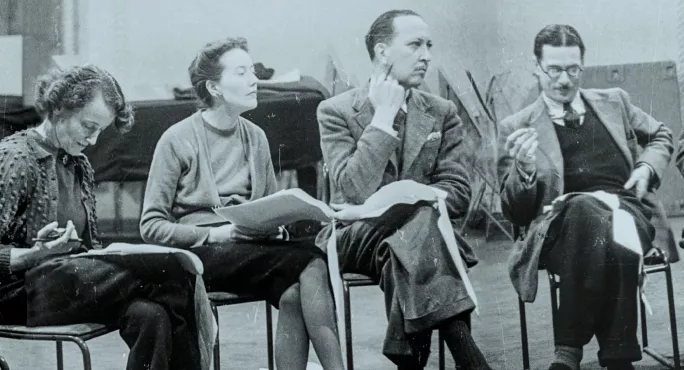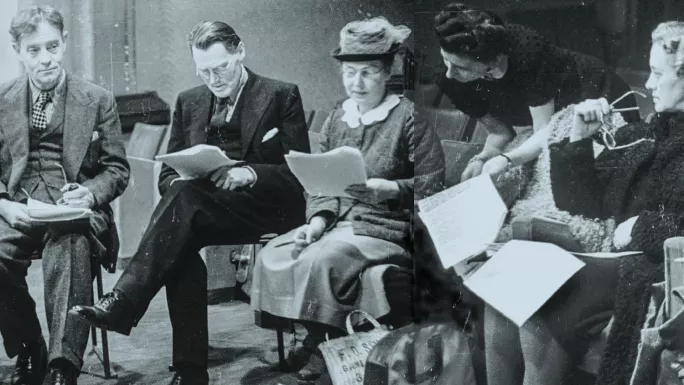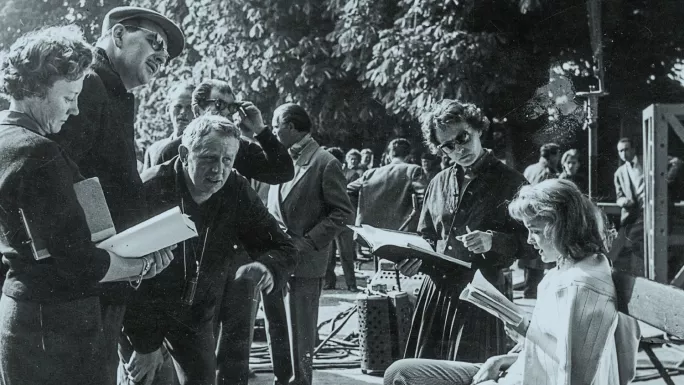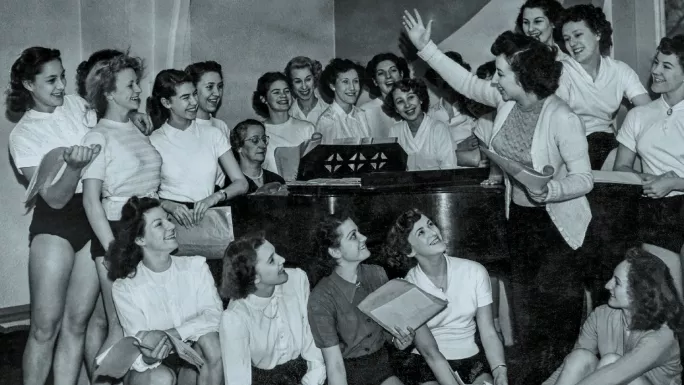- Home
- The rise of the scripted teacher
The rise of the scripted teacher

It’s the start of a new school week and you’re teaching verbs again. You’ve lost count of the number of times you’ve taught the topic, but this time something is very different. Clutched in your hand is a script - and it’s not written by you.
“We’re going to remind ourselves about verbs. Verbs make sentences work, so it’s important to know about them,” you read.
“Listen: A verb is the part of a sentence that tells us that someone is being, doing or thinking.
“Listen again: A verb is the part…”
For some teachers, this might sound like an unlikely scenario: planning and delivering lessons of your own design is a fundamental part of the job. Having someone else script what you say, to many, will sound bizarre.
- This was originally published in Tes magazine. To get great content every week, click here.
However, there is evidence that the use of “scripted lessons” is on the rise in schools. And, perhaps surprisingly, it seems there are plenty of teachers willing to embrace them.
So can scripts raise standards and liberate teachers from lesson planning drudgery, as advocates claim?
Opponents are already circling. They warn that scripted lessons will not only constrict the autonomy and creativity of teachers, but they may also sound the death knell for teacher professionalism.
The scripted spectrum
The first thing to note about “scripted lessons” is that the phrase can be used to cover a whole gamut of resources.
At one end of the spectrum are lessons that are fully scripted like a play. At the other are looser plans provided by schools that plot out a clear sequence of learning, but that the teacher can still work around.
Scripts can also come with different degrees of compulsion attached. Sometimes they might be provided as a voluntary tool that the teacher can either use or leave in their drawer. Elsewhere, a school might make following the script mandatory.
Scripted lessons are not new. The father of the modern script is arguably Siegfried Engelmann, the American educationalist who designed the direct instruction teaching approach (see box, below). “DI” is based on the idea that if a child fails to learn, it’s not the fault of the child, but rather the instruction - hence the value of a carefully controlled script.
Engelmann invented DI in the 1960s, and the scripts it uses are at the prescriptive end of the spectrum. It has an impressive research base behind it. “Project Follow Through”, a study funded by the US government in the 1960s and 1970s, found that it outperformed other teaching approaches (see box, page 41).
James Murphy is a former assistant principal who now runs a company that uses DI to help students who are behind in their reading catch up. The lines at the beginning of this article come from a script he wrote when he was working as a head of English.
He argues that scripts are designed to solve the problem of pupils making “entirely reasonable misconceptions out of our explanations, because our explanations haven’t been carefully prepared enough”.
Scripts, he says, can be precisely calibrated to ensure that knowledge is imparted in a way that is “as efficient as possible and completely unambiguous”.
But despite the research and professionals such as Murphy’s belief in their value, scripts have never been mainstream in the UK. But could all that be about to change?
The emergence of academy chains has created an opportunity for the centralised generation of teaching resources, which can then be disseminated to dozens of schools. In many trusts, an increasing number of those resources are scripts. For example, Outwood Grange - a multi-academy trust (MAT) in the north of England - uses standardised “schemes of work” for key stage 3 maths across all its 18 schools. This includes a mandatory scripted component for conceptual lessons, with “teacher notes” used to guide instruction throughout the lesson.
Kathryn Greenhalgh, Outwood Grange’s senior director of mathematics, says the trust takes a prescriptive approach to ensure pupils get “the right progression” in their learning.
“You can’t teach fractions before you’ve taught factors, multiples and primes,” she says. “We’re very prescriptive about that, because if you don’t teach them in the right order, you are going to do children a huge disservice.”
Two more large MATs, Ark Schools and the Inspiration Trust, both use “Expressive Writing” - a highly scripted DI programme originally developed by Engelmann - to help teach punctuation and grammar.
Heather Fearn, curriculum director at the Inspiration Trust’s Thetford Academy, has helped roll out the programme across “most schools in the trust”. She says the beauty of the script is that it delivers an “instruction sequence” that has been refined and rigorously field tested over multiple years, “taking an amount of time and research to get it exactly right that an individual teacher could never achieve”.
Fearn says that when she’s training teachers to use DI scripts, they have “lots of questions” but she hasn’t had any “overtly negative reactions”.
“By the end of the training, people have been pretty happy and pretty excited,” she says.

The idea there is a “best way” of teaching something is an argument frequently used by advocates of scripts. Martyn Oliver, the chief executive of Outwood Grange, goes as far as to say that schools have a “moral duty” to teach in a standardised way.
“If you’ve got a brilliant way of working in one school [within a MAT], well actually you have got a moral duty of then making sure that way of working is having an impact in all of your schools,” he says.
The proponents of scripts are adamant that they do not reflect poorly on the professionalism of their teachers. Oliver says Outwood’s system is “done with” not “done to” staff, and insists it does not “negate the individual professionalism that a teacher brings to their classroom”.
Fearn says that it’s the most experienced teachers who use DI scripts most effectively. Ark says that its scripts have scope for “adaptation once teachers are familiar with the plans and resources”.
How scripts and other resources are produced and circulated differs between MATs. At Outwood Grange, each school in the chain is tasked with developing lessons for a different topic. The lessons are then quality assured by Greenhalgh’s central team and shared across the trust.
“One of my heads of department was on another school visit, and she actually could say to the kids in that class - that’s my lesson, my department designed that lesson!” she recalls.
John Blake, head of education and social reform at the Policy Exchange thinktank, says that other MATs might choose to employ experts who create resources on a full-time basis, with “career development pathways” for classroom teachers who want to move into this work.
Here to help
While MATs may talk up the benefits to learning of using scripts, though, there is another factor that is increasing the use of scripted lessons: the current strains on the teaching profession. With teacher shortages in a number of subjects, scripts could potentially act as a crutch for those working outside of their subject.
Another pressure is workload - the average classroom teacher has a 54-hour week, with planning identified by the government as one of the key drivers of excessive workload. Blake says it’s a common sight to go into a school and see “teachers one, two and three in neighbouring classrooms planning identical or near-identical lessons”.
He thinks the workload crisis is encouraging schools to cut out this duplication through the creation of shared resources.
“We have to recognise that it is unhealthy for teachers to believe that they should only be delivering things that they have planned and prepared and designed fully themselves,” he says. “That generates a workload culture that is fundamentally unsustainable.”
Because of this mix of factors, Blake thinks that scripts will become an increasingly important part of the teaching landscape in future years, and that this is to be welcomed. He’s not the only one.
Mark Lehain, the founder and former head of the Bedford Free School and now director of Parents and Teachers for Excellence (PTE), thinks social media and insights into how people learn from cognitive science will further fuel their rise.
“Cognitive science suggests to me that we will approach things in a more systematic way,” he says. “We’ve got the tools to disseminate this within MATs and we have a teacher community on Facebook and online forums that can share stuff. In five or 10 years’ time, you’ll probably see more scripts.”

To be clear, these teachers are not advocating scripts for everything. Even the most vociferous proponents agree that they are more relevant to certain types of teaching than others.
“People sort of think: ‘Huh? I wouldn’t want to use a script to teach a poem,’” says Fearn. “That is a misunderstanding of what these direct instruction programmes are devised to do.”
“You do not do it all day, every day - nobody is interested in doing that,” agrees Murphy. He also thinks fears that scripts will straitjacket practice are misplaced.
“People think that because you’ve prepared your script beforehand, that means you can’t respond to the student if they say something you didn’t plan. That’s simply not the case.”
Advocates say scripts work best in foundational areas of knowledge such as writing, reading - they point out there is already a degree of scripting within phonics - and teaching simple facts, rules and concepts in other subjects.
Even this amount of scripting is too much, though, according to critics. While some people argue scripts can liberate teachers from pointless workload and improve students’ learning, it’s no secret many teachers baulk at the idea of them. They fear that scripts will turn them into robots, mechanically regurgitating lines to their class.
Alex Quigley is director of research at Huntingdon Secondary School in York and the author of several education books. While he can see the potential for the use of scripts for newly qualified teachers or those working outside their subject, he’s a script sceptic who feels they’re not flexible enough for the dynamic environment of the classroom. “A script feels like it hamstrings the practice,” he says.
David Williams, a key stage 4 coordinator in English at Ysgol Dffryn Aman school in Wales, has some experience of that. He was once asked to use a poorly constructed script and says it felt “a bit like trying to teach through someone else’s brain”.
Indeed, the negative side of the social media reaction when scripting gets mentioned tends to focus on this personal element. If you have not planned it and done so in accordance with where the children are in their learning and feedback from previous lessons - not to mention utilising knowledge of the children and adaptations for SEND - then how effective can that lesson really be?
Global application
That depends, according to Dylan Wiliam, emeritus professor at the UCL Institute of Education. He thinks it’s difficult to say exactly what impact the widespread use of scripts would have.
“In any example of telling teachers what to do, there are going to be trade-offs,” he says. “There are going to be some teachers who are improved by being told what to do and there are others who are going to be made worse. The question is, how many of each group - and how much better or worse?”
Wiliam thinks that scripting lessons word for word “probably is necessary” in some developing and middle income countries, which lack a regular supply of quality teachers. He thinks that in Britain, there are probably “too few teachers who are so bad that they would be better by being made to follow a script” - though he claims to have trained an “awful lot” who would have been. He also admits there is a “danger” that teachers using a script can end up on autopilot, taking “no account of whether the students are actually learning what they’re meant to be learning.”
While he might not back detailed scripts in this country, Wiliam sees “nothing wrong” in telling teachers they should adhere to a “consensus view” about what is the best sequence to teach a topic.
“Whether you call that a scripted lesson or not is a matter of definition, but I would be totally in favour of a consensus view,” he says.
This is linked closely to an interpretation of professionalism that holds that a teacher must work in a way that is understood, on the basis of evidence, to be the most effective way of imparting learning. It’s striking how many times supporters of scripts make the leap to analogies with the medical profession at this point.
“Imagine if you were - God forbid - faced with major surgery and about to be put under by an anaesthetist,” says Oliver. “The surgeon leans over to you and says ‘It’s never been done like this before, your operation, but I’m going to experiment on you.’ It doesn’t take place because they’re professionals.”
Lehain also uses the analogy: “You would never say to a surgeon: ‘Don’t you feel disempowered, because whenever you’re doing that particular kind of stitch you have to do it a certain way?’”.

Blake makes it a hat-trick of medical metaphors. “GPs don’t produce all of the medicines they prescribe themselves, but that doesn’t invalidate their professional expertise. Their job is to understand how best to work with the people in front of them and that’s what teachers have to do.”
Script critics would argue that there are holes in these analogies. There is not a single method of treating every patient - a GP will regularly weigh up a number of treatment options and select the one they believe best fits the case. And medicine is arguably less reliant on the relationship between patient and doctor than teaching is on the relationship between teacher and pupil.
So how about acting as an analogy instead? Lehain says actors memorise a script so they no longer have to think about what words they’re saying, but can concentrate on how they say them, what they mean, and how they can be brought to life. He calls this the difference between “learning by rote” and “learning by heart”.
“We don’t think that actors are disempowered when they have to learn a script. If we think of ourselves as the actors, the artists who are bringing lessons to life, I think there’s no harm in having to learn stuff or follow a script - it’s how you do it by heart, not by rote,” he says.
Lehain isn’t the only person who believes that scripts have the potential to free up teachers to concentrate on more value adding activities. While Greenhalgh believes that Outwood Grange’s approach has cut workload, she’s at pains to say this doesn’t mean teachers are no longer planning.
“What it means is that the teachers can spend their very valuable planning time on actually addressing the needs of the children within their class”. The alternative - scouring the internet for resources - is “a complete waste of time,” she says.
Unwelcome intrusion
While cuts to workload, medical analogies and promises of liberation from drudgery may convince some teachers, for others the classroom remains a sacred place and intrusions are wholly unwelcome.
“The reality is that teachers don’t like being told what to do in the classroom and they don’t like scripts,” says Quigley.
Alistair McConville, deputy head at Bedales School, agrees. He believes teachers at his school would “openly rebel” if he ever tried to introduce scripts. “[They] would be horrified by it and would feel like they’ve become a functionary rather than a teacher who relates to kids,” he says, adding that, if they were to be introduced, it would be a sad indictment of the education system.
“My slightly cynical thought is that maybe this has been necessitated by not being able to get teachers who are articulate or knowledgeable enough,” says McConville. “It would be pretty damning on the state of the nation if we had to use these widely.”
Quigley adds that scripts have so much negative baggage that their proliferation would exacerbate recruitment problems.
“If we’re going to have a world-class teaching profession, we need to raise the bar and make the profession more prestigious,” he says. “That’s making it intellectually attractive, that’s making graduates see it’s a valued profession. Scripts, wherever you stand on them, makes it look ‘off the shelf, lack of expertise, anyone can do it’.”
Quigley’s comment sums up what lies at the heart of this issue: the scripted lessons debate appears to be a struggle over what constitutes teaching. It’s a contest between two competing visions of what it is to be professional.
Advocates of scripts emphasise adherence to a common, proven way of working. It might lack originality, but the payoff comes when the child or young person leaves school and the teacher can see they’re better off for the method of instruction.
Critics of scripts focus more on defending the autonomy of the teacher and the authenticity of their interactions with pupils.
In the coming years, how far scripted lessons get in schools will be a useful bellwether for which direction that debate is moving.
Will Hazell is a reporter for Tes
- This was originally published in Tes magazine. To get great content every week, click here.
Keep reading for just £1 per month
You've reached your limit of free articles this month. Subscribe for £1 per month for three months and get:
- Unlimited access to all Tes magazine content
- Exclusive subscriber-only stories
- Award-winning email newsletters



